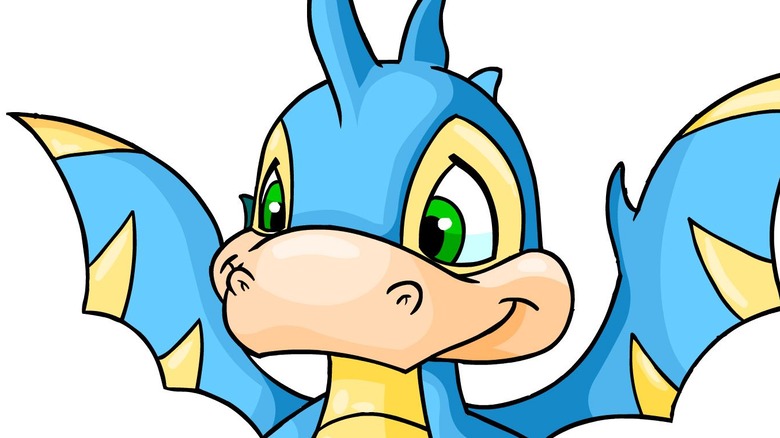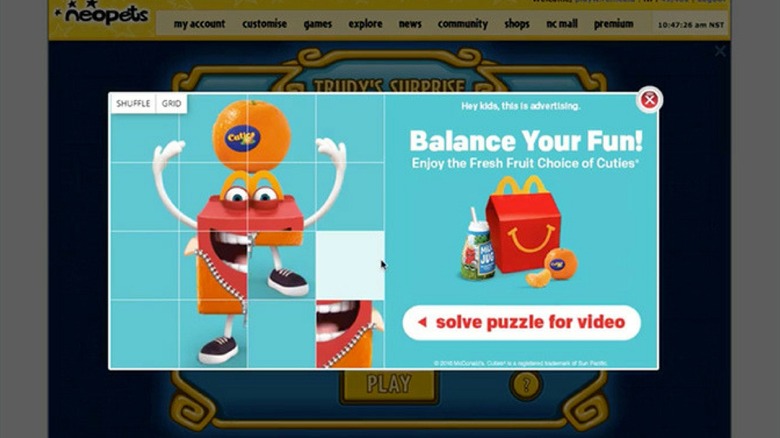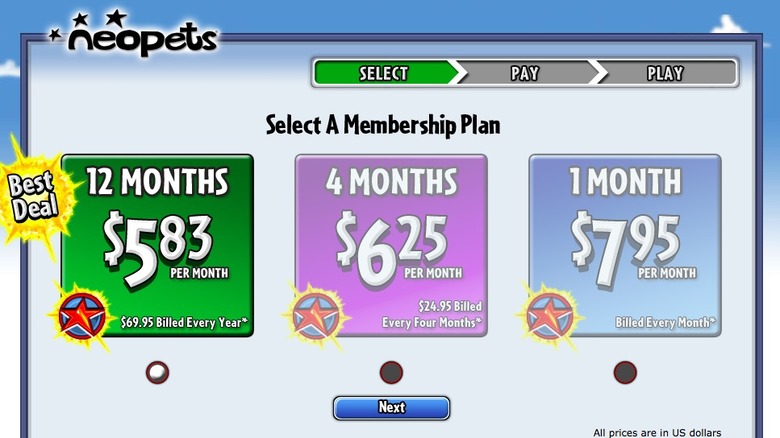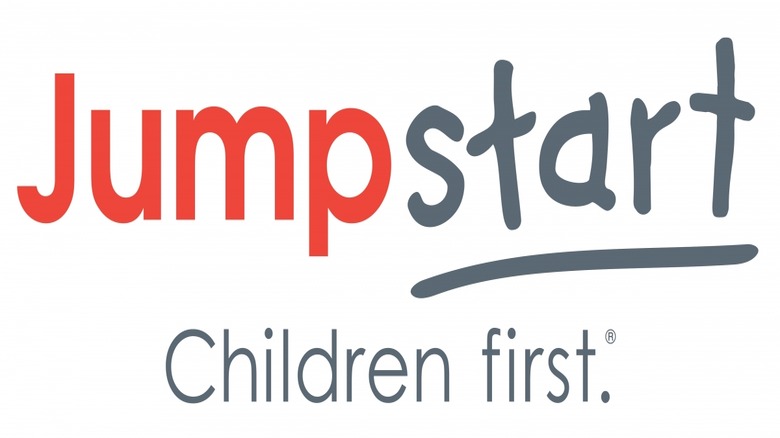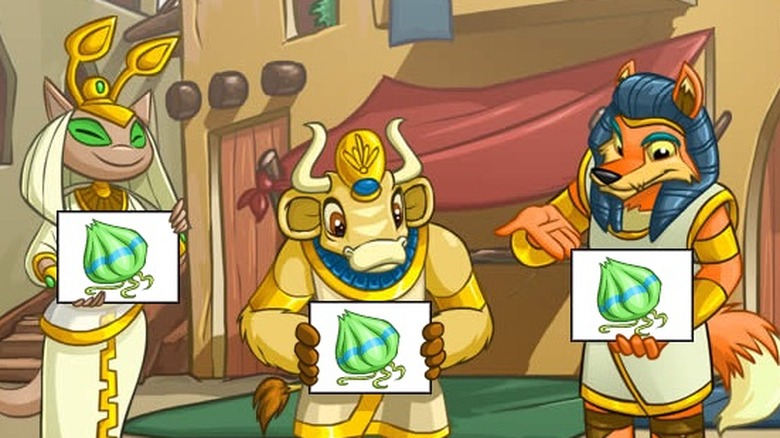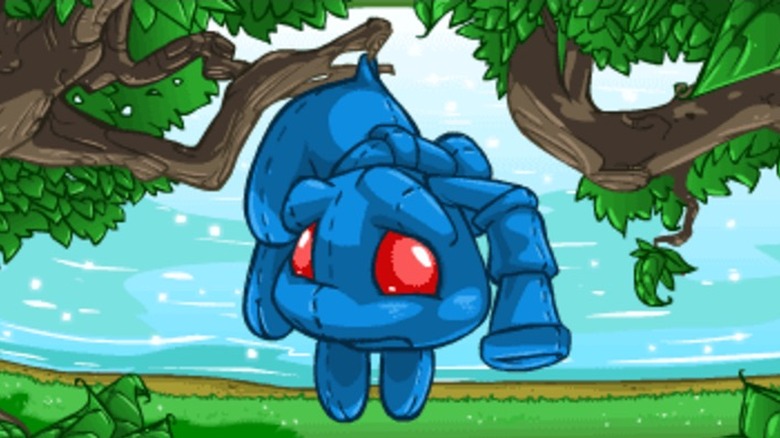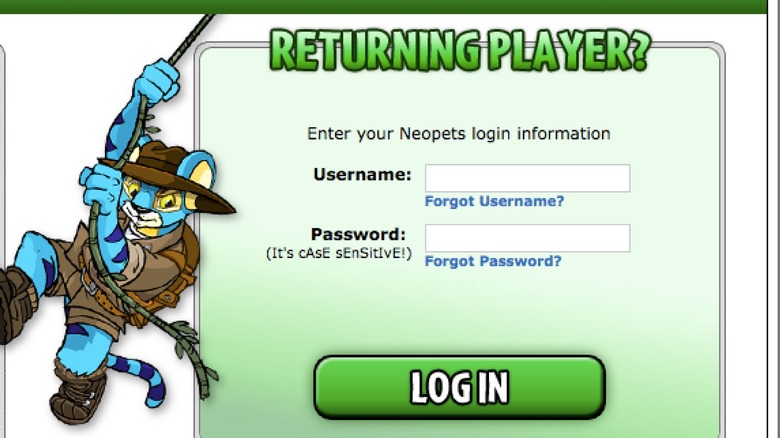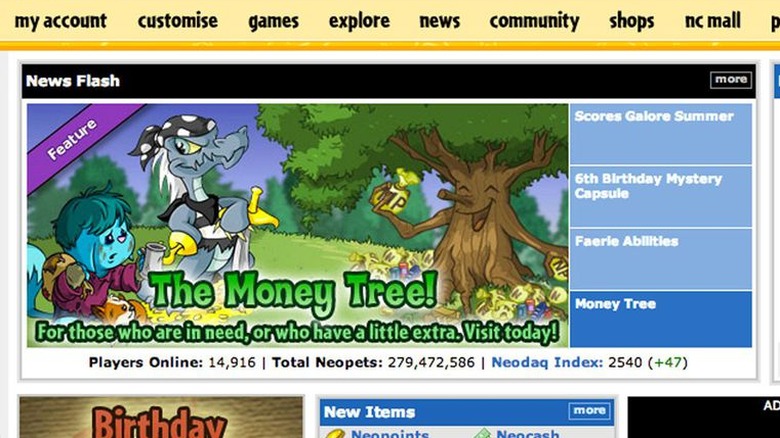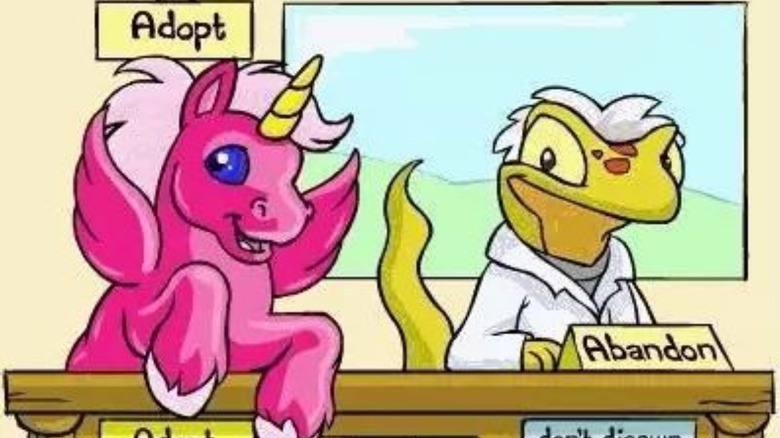The Untold Truth Of Neopets
If you're a true '90s kid, odds are you played Neopets. The highly addictive kids game allowed users to care for virtual pets, letting them live in a created world where they could play games, buy and sell goods, and even invest in the stock market. At the height of its popularity, the site was ranked the second stickiest on the Internet, with users spending an average of six hours and 15 minutes per month on the site–beating out competitors like Yahoo!, AOL, and eBay.
Today, however, Neopets' popularity has severely dwindled. The site's users are now mostly over 13 years old; it gets about 100,000 page views per day, as compared to 2.2 billion page views per month in 2005. News outlets across the web have written about how the site is dying, and its fans have taken to social media to express their fear that the site will just disappear off the web one day.
How did something that was once nearly ubiquitous fall so far from grace?
Neopets was initially meant for teens and young adults
Neopets was created by British college students Adam Powell and Donna Williams in 1999. According to a 2005 Wired feature, the pair had met in high school, and as they went through university together, they became inspired by their own real-life pets, which included everything from birds to guinea pigs to a very crotchety cat. The pair realized that caring for virtual pets may be addictive enough to convince people to keep coming back every day, allowing for a solid marketing strategy–if it ever even got to that point.
Powell has said that they were thinking they could potentially make some money off banner advertising on the site, but as it grew in popularity, they realized what a potential behemoth they had on their hands. The site's main audience, however, didn't end up being the pair's initial target–they had thought it would be a good way to keep university students entertained, but the cutesy pets became a favorite with children. They decided not to give up the lucrative young audience and reworked their innovations to fit more with their users.
Neopets' first CEO was inspired by L. Ron Hubbard
People started to take notice when Neopets took off, and Powell and Williams found themselves in over their heads. They ended up giving control of the business to Doug Dohring, founder of the market research firm The Dohring Company, who had a lot of interest in the potential for advertising to the site's young audience. (More on those controversial strategies later.)
Dohring set about building the company, with an interesting inspiration—Scientology founder L. Ron Hubbard. Dohring, who is a member of the controversial church, borrowed elements from Hubbard's Org Board, a system of departmental organization that he says uses techniques inspired by "an old Galactic civilization" that lasted for 80 trillion years. Dohring downplayed the additions to the company, saying that doing things like including a corrections department that monitors the performance of other departments was just "common sense."
Still, Neopets' connection to Scientology has not been without controversy of its own. Williams said in a Reddit AMA that she and Powell were "totally naïve" at first when it came to Dohring's connection to the church, and added it "was a bit of a shock" when they learned of it. However, she said that it didn't change much about the site, aside from an "odd test" that interviewees had to take and the fact that "obscure celebrities" came around the office. She did reveal, though, that there was at one point "some talk" of putting Scientology education on the website, but she and Powell struck it down.
Neopets' strategy of marketing to children is very controversial
Dohring wanted Neopets for one big reason: its young, addicted audience. Seeing how youngsters stayed particularly dedicated to the site, Dohring used it to pioneer a new and controversial marketing strategy called "immersive advertising." Immersive advertising avoids traditional marketing in favor of something more instinctive—ads that are buried within the gameplay, like Neopets' Disney Theater and old games like Limited Too Mix and Match and Berry Lucky Charms Triple Track.
In its heyday, Neopets' advertising strategy was hugely successful. The company partnered with huge brands like McDonalds for advertising campaigns, and, according to a since deleted article on The Kernel, about 60 percent of their revenue came from sponsorships. However, many parents and consumer watch groups had issues with their kids being targeted by advertising in such an insidious way.
"Kids are not as smart as we think they are," said Kalle Lasn, founder of Adbusters Magazine to The New York Times about the site in 2002. "They're not smart enough to work out the packaging. We are targeting kids before they are old enough to figure these things out. They can't tell the difference between an ad and non-ad content. It's all just one big blur in a big attention-getting device."
Advertising and pay-to-play features kept growing over the years
When Neopets launched, all of its features were entirely free, and pop-up and banner ads were nowhere to be found. However, over the years, advertising and pay-to-play features increased on the site, upsetting many of their longtime fans. The pay-to-play features include a Neopets premium option, which gives users the ability to view the site without ads, adopt a fifth Neopet, and get extra Neopoints every month.
The game's other major pay-to-play feature, the Neocash Mall, was introduced in 2007. According to Motherboard, the Neocash Mall allows players to purchase goods within Neopets using real world money via Paypal. Many players were upset to hear that the game was now providing advantages to those willing to shell out real cash, and although the company tried to calm them with a game offering the chance to win Neocash, fans still weren't happy.
Multiple ownership changes have caused controversy
In 2005, with Neopets-mania still at its height, Dohring sold the company to Viacom, the conglomerate behind Nickelodeon, Comedy Central, MTV, and more. The move was heralded as a success for Dohring, Powell, and Williams, although the two founders have since said that they weren't entirely happy with the new ownership and they "weren't really involved" in the decision to sell.
"It was a very odd situation," Powell wrote in her Reddit AMA. "We were extremely naive and our only focus was what we thought was best for the site. If we could do it again, there would definitely be things we did differently." She added that the "lack of control" was part of the reason why she and Williams later chose to leave the company, writing, "We knew what would be best, but were not able to take the company in that direction. After years and years of fighting a losing battle, you just give up."
Neopets' time at Viacom represented a period of lessening popularity for the site, and they eventually sold it to JumpStart in 2014. The move to JumpStart also came with a lot of controversy of its own, with rumors of extensive staff layoffs fueled by a massive meltdown in which all of Neopets' chat board filters were briefly turned off, leading to a huge influx of profanities and adult content on the site. While JumpStart later blamed it on a facilities move, the mistake didn't do anything to clear up fans' fears that the site could be headed offline.
There was going to be a Neopets movie
Neopets on the big screen? It almost happened. Variety reported in March of 2005 that Warner Bros. Pictures was set to create a CGI-animated movie based on the Neopets, and the movie received a bit more momentum that next year when future Alexander and the Terrible, Horrible, No Good, Very Bad Day writer Rob Lieber was brought on to pen the script. Jimmy Neutron's John A. Davis, meanwhile, was set to direct.
Although movie studios have had luck since turning children's products into movies–with 2014's The Lego Movie earning a Golden Globe nomination for Best Animated Feature and 2016's The Angry Birds Movie grossing $349.7 million worldwide–the Neopets movie never came to fruition. An official reason never materialized, leaving fans to wonder about what may have been.
The Neopets economy has gotten out of control
It's weird to talk about the economic implications of a kids' game, but for Neopets players, the game's spiraling economy has been a source of huge consternation. The game has been dealing with rampant inflation that has actually prevented a lot of new players from being able to fully enjoy Neopia, and the site hasn't really tried to intervene and try to make the problem better.
Neopets' inflation problem comes from the fact that more and more currency keeps getting introduced in the market, without any of it going away. As new players sign up and old players continue to earn Neopoints through games and quests, more and more Neopoints exist. Although the staff has tried to introduce a few ways of dealing with this problem, including deleting old accounts and introducing money sinks like Tombola donations, random events, and stamp auctions and re-releases, none have taken enough currency out of the market to effectively fight the issue.
Inflation reached its worst point when the site was in a period of massive expansion in the early 2000s, but it's continued to plague the game, with rare and popular items selling for millions of Neopoints in users' shops. This has been restrictive for new players entering the game, and may be a part of why the site has struggled to bring in younger audiences over the years. With such high barriers to enter into even the middle class of Neopia, the draw of the site has faded.
Identity thieves have targeted the site
Neopets' younger audience made it a high-priority for advertisers, but it also made it a target for hackers. The site was hit by identity thieves in 2009, with hackers tricking kids into clicking on a link to a special site allowing them to make their own paintbrushes. However, the software they downloaded to create the paintbrush was actually malware designed to steal their parents' private information.
This isn't the only time that Neopets has been hacked, either. In 2016, Vice reported that "tens of millions" of Neopets accounts were the target of a hack that collected their email addresses, usernames, passwords, and dates of birth. Although Neopets' chief revenue officer Jim Czulewicz said in a statement that the company does not keep any credit card data, the site's cybersecurity appears to be an easy target.
Some users target others
Neopets hasn't only been targeted by outside hackers. The site has a problem with users targeting other users, with some members taking advantage of their more naïve counterparts to convince them to fork over their password—and all of their Neopoints. A common way of doing this is creating a scam login page offering people a prize or a low-priced rare item if they enter their Neopets name and password; another even easier way was to just use Neopets' message feature pretending to be a staff member to ask for their information.
Neopets does maintain a Wall of Shame page warning its users against some of the most common scams, but that hasn't stopped plenty of users from falling victim. Many Neopets fan sites also host their own pages on how to avoid the sites' scammers. Others have interviewed hackers to try to get their motivations, with one frequent scammer saying they took to the immoral side of the site after being hacked themselves.
Some people have been playing for almost their entire lives
Neopets' audience used to be largely young kids—in 2004, the New York Times reported that 39 percent of the site's users were under 13, while 40 percent were between the ages of 13 and 17. However, as the site grows up, its users grow up with it, and now, Neopets has a large number of older users—20 percent are over 18-years-old, as of a 2013 Mashable article. JumpStart's CEO David Lord even told Kotaku Australia that the company wanted to buy the site because of its popularity with an older audience.
Many older Neopets users have remained loyal to the site since they started as kids. Video game psychologist Dr. Jamie Madigan says that, for some players, the game (and their virtual pets) may start to feel like a part of who they are. Having played for so long, people start to "incorporate brands and specific products into their identity," keeping them coming back.
"There may be something involved called loss aversion," Madigan told Mashable. "In short, people hate losing something— more than they love gaining something of equivalent value. If Neopets players feel like they have to keep playing in order to maintain everything they have built up, loss aversion in general and psychological reactance may have set in. And if logging in every few days is all it takes to keep options open, they'll do it."
So basically, if you're getting an itch to log back onto Neopets, you're definitely not alone.
Neopets inspired many girls to get into coding
Although there's been a lot of controversy surrounding Neopets, the site has also had a positive impact as well. As one of the few gaming sites with a majority female audience, Neopets has actually served as the inspiration for a lot of young girls to get into coding, according to a 2017 Rolling Stone article.
As the article notes, Neopets' HTML-based programming was the first exposure many girls had to coding. This included building their own shops and user profiles within Neopets, as well as expanding off the site for fan pages and more. Some users even used their newfound HTML skills to build profiles for others in exchange for popular items.
Many users have credited Neopets' popularity with females to its open world and the ability to conceal your gender through your username and pet, making the site a more friendly place for women on the Internet than many others. This allowed women more freedom to experiment, giving them the motivation to get into coding—and to stick with it as they got older. The site's influence isn't just in the U.S. either; Nigeria's first female Google Developer Expert Ire Aderinokum credits Neopets' HTML with getting her interested in computers.

